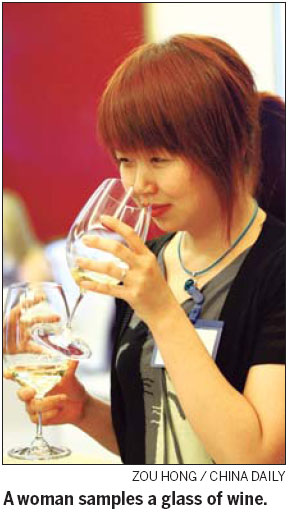
Beijing played host to 10 outstanding Australian regional winemakers on Friday in a special event at J & E Mansion, near Chaoyang Park, organized by Wine Australia, part of the government-sponsored Australian Wine and Brandy Corporation.
The winemakers stemmed from different Australian wine producing regions, including New South Wales' Hunter Valley, South Australia's Adelaide Hills and Western Australia's Margaret River.
In order to play up how Chinese cooking could compliment the wines, the 10 tables were adorned with different Chinese cuisine.
Each winemaker was given a table on which wines - which included Brokenwood Semillon from Hunter Valley, Domaine A Pinot Noir from Tasmania and Hardy's Oomoo Chardonnay from Adelaide Hills - were introduced.

"The braised chicken with spicy sauce was my favorite," said PJ Charteris, a winemaker from Hunter Valley. "It went well with the heavy flavor of a glass of Wirra Shiraz from McLaren Vale."
Lucy Anderson, Wine Australia's Asia director, said that just being "good" and stating "Australia" on the label was no longer enough to tell the true story of Australian wine.
"A more specific introduction to Australian's hugely diverse wine community is necessary in the world's next fine wine frontier, China," she said.
Charteris agrees with the chance for expansion.
"The opportunity of this new market is very positive," said the avid professional, with more than 10 years in the market.
A major factor for success is the sheer size of the market in Beijing. The total population of Australia sums about 21 million, while Beijing has a population of 22 million alone.
"We are amazed at the number of potential wine consumers in this market," Charteris said.
Wayne Stehbens, from South Australia's Barossa Valley, who has been a winemaker for 31 years, said Chinese people in the wine industry are much younger than those in Australia.
He said that as little as one decade ago, the only experts in China were Europeans. These days, many Chinese know what constitutes a good wine because the language barrier has faded and the culture is being passed directly.
Anderson said what separates Australia from other wine-producing countries is the people behind the wines. Australian winemakers like to experiment, unlike Europeans who follow strict rules relating to their grapes.
"The philosophy is to make the best wine in any particular place," Charteris added.
Joe Ma, a manager with Aussino World Wines, said Australia wines have stories to tell and reflect an uncompromising pursuit of viticultural and winemaking excellence.